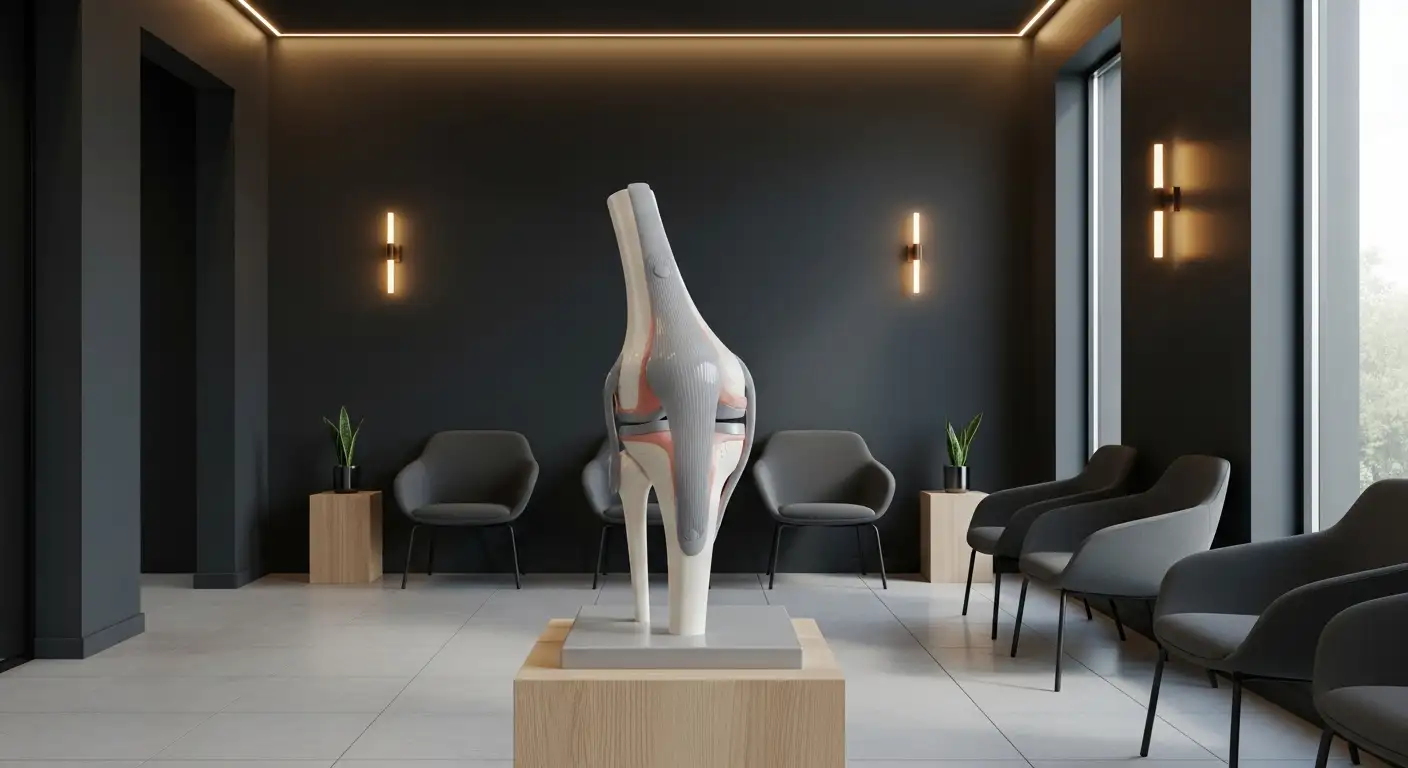Managing Chronic Knee Pain
Effective management of chronic knee pain involves a holistic approach that typically includes exercise and weight management. Both of these factors can significantly impact the degree of knee pain a person experiences and their overall knee health.
Importance of Exercise
While it might seem counterintuitive to move a painful joint, exercise is a crucial component of managing chronic knee pain. Resting too much can weaken muscles, which can lead to increased reinjury in knee pain conditions. Therefore, it is advised to find a safe exercise program for knees to maintain muscle strength.
In a randomized clinical trial, a diet and exercise intervention resulted in a statistically significant reduction in knee pain in patients with osteoarthritis and overweight or obesity. The adjusted mean difference in Western Ontario and McMaster Universities Osteoarthritis Index (WOMAC) pain score at 18 months was -0.6, which met statistical significance.

Weight Management for Knee Health
Weight management is another key aspect of managing chronic knee pain. People who are overweight or obese are at a greater risk for knee problems. For every pound that a person is overweight, their knee must absorb an extra 4 pounds of pressure when they walk, run, or climb stairs.
Weight loss reduces stress on the knee joints, and even small changes in weight can make a big difference in managing knee pain. According to WebMD, losing weight can significantly improve knee pain, as each step transmits two to four times the body weight through the knee joint. Furthermore, people with arthritic knees lose about 20% of their pain with every 10 pounds of weight loss.
In conclusion, both regular exercise and weight management are essential components of a comprehensive approach to managing chronic knee pain. By maintaining a healthy weight and staying active, individuals can help to reduce their knee pain and improve their overall knee health.
Alternative Treatments for Knee Pain
In addition to standard medical treatments, there are several alternative therapies that can provide relief for individuals with chronic knee pain. These include acupuncture and the use of cushioned insoles.
Acupuncture for Pain Relief
Acupuncture, a traditional Chinese medicine practice, is often used to relieve various types of pain, including knee pain. This alternative medicine practice involves placing hair-thin needles into specific areas of the skin on the body to stimulate nerves, muscles and connective tissue. This stimulation boosts the body's natural painkillers and increases blood flow.
Acupuncture has been suggested as a treatment option to help relieve knee pain caused by osteoarthritis. While acupuncture is generally considered safe when performed by an experienced practitioner, it's important to discuss this treatment option with your doctor to ensure it's suitable for your specific situation.
In some cases, your doctor might recommend injections of medications or other substances directly into the knee joint as part of the treatment plan for knee pain. Examples of substances that may be injected include corticosteroids or hyaluronic acid.
Benefits of Cushioned Insoles
Another effective alternative treatment for knee pain is the use of cushioned insoles in shoes. These insoles can provide additional support and cushioning for the feet, which in turn reduces stress on the knees. This is particularly beneficial for individuals with knee osteoarthritis.
Cushioned insoles can be custom-made to fit your feet or purchased over-the-counter. They are typically made of foam, gel, or plastic and can be slipped into your regular shoes. By evenly distributing the weight across your foot, these insoles can reduce pressure points and relieve pain in the knee.
Keep in mind that while cushioned insoles can provide temporary relief from knee pain, they are not a cure for underlying conditions. It's important to consult with a healthcare provider to establish a comprehensive treatment plan for chronic knee pain.
Exercise Do's and Don'ts for Knee Pain
Dealing with chronic knee pain often requires a careful approach to physical activity. This includes understanding which exercises can be beneficial, and which may exacerbate pain or increase the risk of injury.
Impact of High-Impact Exercises
High-impact exercises, such as running and jumping, can place significant stress on the knee joints. As such, these activities should be avoided in cases of knee pain, as they can further injure the knees and exacerbate the discomfort [1]. Similarly, exercises that put excessive stress on the knees, such as lunges and deep squats, should be avoided to prevent worsening pain or injury.
However, it's important to note that resting too much can weaken muscles and increase the risk of re-injury. Therefore, it is advised to find a safe exercise program for the knees to maintain muscle strength [1].
Exercise Interventions for Pain Reduction
To reduce chronic knee pain, it is beneficial to focus on exercises that build strength in the quadriceps and hamstrings, while also maintaining muscle flexibility. Balance and stability training can also help prevent knee injuries and joint deterioration.
Strengthening the muscles around the knee through physical therapy or different types of strengthening exercises is recommended to make the knee more stable. These exercises should be tailored based on the specific condition causing the pain. People who are physically active or practice sports may require exercises to correct movement patterns and establish good technique during activities.
Furthermore, maintaining flexibility and overall muscular conditioning can help prevent overuse problems in the knees. Stretching is recommended to relieve pressure on the knees and kneecaps, helping to alleviate knee pain.
Conquering chronic knee pain involves a comprehensive approach that includes not only appropriate exercise but also proper treatment and lifestyle modifications. Always consult a health professional to ensure that your exercise routine is suited to your specific needs and condition.
Understanding Knee Pain Causes
To effectively manage pain, understanding the root causes is crucial. In the case of chronic knee pain, several factors can contribute, ranging from medical conditions to lifestyle habits.
Injuries and Medical Conditions
Knee pain can result from a variety of injuries and medical conditions. According to RUSH University Medical Center, inflammation caused by improper lifting, poor flexibility, inadequate footwear, muscle weakness, and high-impact fitness routines without proper warm-up can lead to knee pain. Structural knee problems such as arthritis, torn cartilage, or ligament damage are also common contributors.
Mechanical knee issues, such as those resulting from a direct blow, sudden movement, or osteoarthritis from wear and tear, can lead to pain and difficulty walking. On the other hand, inflammatory knee problems can stem from rheumatic diseases like rheumatoid arthritis and lupus. These conditions cause swelling that can lead to permanent damage in the knees.
In some cases, knee pain caused by osteoarthritis may be permanent without surgery or other extensive treatments. The long-term management of such conditions often involves controlling pain, preventing flare-ups, and reducing knee irritation [3].
Factors Affecting Knee Problems
Apart from injuries and medical conditions, several other factors can increase the risk of knee problems. For instance, weak muscles can lead to knee injuries, while a lack of muscle flexibility can exacerbate the risk of knee issues.
Moreover, lifestyle factors can also play a role in the development of chronic knee pain. Overuse or physical activity, for instance, can worsen knee pain. While chronic knee pain cannot be entirely prevented, certain lifestyle changes can help alleviate the pain.
Understanding the causes of knee pain is the first step towards effective management and treatment. By identifying the contributing factors, it is possible to tailor a treatment plan that addresses the root cause while also managing the symptoms. In the next sections, we will explore various ways to diagnose and treat chronic knee pain, aiming to provide relief and improve quality of life for those affected.
Diagnosing and Treating Knee Pain
Diagnosing and treating chronic knee pain, defined as pain that lasts longer than 90 days, is an essential step towards reducing discomfort and improving mobility. Various healthcare professionals play a pivotal role in this process, including pain management specialists, orthopedists, rheumatologists, and physical therapists.
Diagnostic Tests for Knee Pain
Diagnosing chronic knee pain involves a combination of medical history review, physical examinations, and various diagnostic tests. Each possible cause of knee pain may require different tests, such as blood work, X-rays, CT scans, MRIs, and other imaging tests. In some cases, the pain may be referred from another part of the body, such as a hip injury, necessitating a thorough examination to accurately determine the source of the pain.
Treatment Options for Chronic Knee Pain
Treatment for chronic knee pain is multifaceted and typically involves a combination of treatments designed by pain management specialists. The goal of treatment is to manage pain effectively with minimal side effects, and it may include more than just medication.
In some cases, surgical intervention may be considered if non-surgical treatments have been ineffective or in cases of severe issues, such as severe ACL tears. For instance, the University of Michigan Health offers various knee surgery solutions, from simple sprains to complex problems.
Bear in mind, diagnosis and treatment should always be conducted by a licensed professional. Health systems like Beaumont and the University of Michigan Health offer specialized treatment for knee issues, providing comprehensive care that includes exams, imaging, surgical referrals, and access to specialists. Always consult with your healthcare provider for the best approach to manage chronic knee pain.
Expert Care for Knee Conditions
When dealing with chronic knee pain, the involvement of healthcare professionals who specialize in diagnosing and treating such conditions is crucial. This section focuses on the roles of pain management specialists, orthopedists, and physical therapists in managing knee conditions.
Role of Pain Management Specialists
Pain management specialists play a vital role in diagnosing and treating chronic knee pain. These experts specialize in managing pain and are equipped to develop a comprehensive treatment plan tailored to the needs of each patient. Their strategies for managing chronic knee pain often involve a combination of treatments, providing a holistic approach to pain management [8].
Treatment plans developed by pain management specialists are dynamic and adaptable. They consider the patient's medical history, lifestyle, and the severity of the pain. Recommendations may include medications, physical therapy, alternative treatments like acupuncture, and in some cases, referrals to other specialists for further evaluation and treatment.
Involvement of Orthopedists and Physical Therapists
Orthopedists, rheumatologists, and physical therapists are other healthcare providers that may be involved in diagnosing and treating chronic knee pain. They specialize in conditions related to bones, joints, and muscles, and can provide additional support in managing knee pain [8].
Orthopedic knee programs, such as the one offered by Beaumont Health System, comprise experts specializing in a wide range of knee conditions. These include chronic knee conditions that, if left untreated, can result in long-term pain and dysfunction. Beaumont's orthopedic knee surgeons are recognized for providing innovative care across Metro Detroit, offering advanced treatments for knee pain and conditions, including joint preservation procedures aimed at preventing the progression of arthritis in young adults.
Physical therapists support the recovery process by helping patients improve mobility, strength, and flexibility. They provide exercises and stretches designed to alleviate pain and prevent further injury. Physical therapy can often help patients manage their knee pain effectively and regain their quality of life.
Knee problems, both mechanical and inflammatory, are prevalent and can result in pain and difficulty walking. Mechanical knee problems can be a result of a direct blow, sudden movement, or osteoarthritis from wear and tear. In contrast, inflammatory knee problems can stem from rheumatic diseases like rheumatoid arthritis and lupus, causing swelling that can lead to permanent damage in the knees.
In summary, the management of chronic knee pain involves a multidisciplinary team of specialists who work together to provide an individualized treatment plan designed to alleviate pain, improve function, and enhance the patient's overall quality of life.
References
[1]: https://www.webmd.com/pain-management/knee-pain/knee-pain-dos-and-donts
[2]: https://www.ncbi.nlm.nih.gov/pmc/articles/PMC9856237/
[3]: https://www.healthline.com/health/chronic-knee-pain
[4]: https://www.rush.edu/news/preventing-knee-pain
[5]: https://www.mayoclinic.org/diseases-conditions/knee-pain/diagnosis-treatment/drc-20350855
[6]: https://www.mayoclinic.org/diseases-conditions/knee-pain/symptoms-causes/syc-20350849
[7]: https://www.uofmhealth.org/conditions-treatments/cmc/knee
[8]: https://www.asahq.org/madeforthismoment/pain-management/types-of-pain/knee-pain/
[9]: https://www.beaumont.org/conditions/common-chronic-knee-conditions





